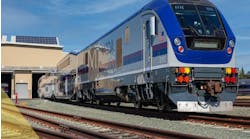MA: MBTA weighs future of fare-free bus service
By Christian M. Wade
Source The Salem News, Beverly, Mass. (TNS)
MBTA officials are looking at the possibility of expanding a fare-free bus ride program to cover the agency’s statewide system, but the move would come with a hefty price tag at a time of diminishing federal funding.
A report by the Massachusetts Bay Transportation Authority’s Policy and Strategic Planning team, which looked at the feasibility of maintaining the free fare program after a three-year pilot project in Boston ended in January, is recommending the state consider making the program year-round, and expanding it across the system.
The report’s authors said limited route-specific fare-free bus programs are “geographically inequitable, difficult to communicate, and work against MBTA goals of providing equitable and consistent transportation” in the T’s bus service area.
“These limited pilot programs are unsustainable and are not recommended by the authority as an initiative to pursue,” they wrote. “Any future fare-free bus service expansions should be designed and implemented to serve the entire bus network, not limited to specific routes chosen on a municipality-by-municipality or similar basis.”
But expanding the free fare across the system would come with a big cost for taxpayers, which according to the report ranges from a low of $72 million to upward of $121 million a year.
The report looked at Boston’s experience with doing away with fares on several MBTA bus routes, which wrapped up in January. The three-year free-fare program was funded by $10.9 million in federal American Rescue Plan Act funds, which the city used to reimburse the T for the loss of revenue.
T officials said termination of the fare-free bus program will likely have a disproportionate impact on low-income riders and would likely “fail” the MBTA’s equity analysis process, which requires the agency to ensure that any fare change package does not have a disparate impact on low-income or “riders of color.”
“Politically, it is difficult to remove a service feature that is popular to a segment of riders, no matter the cost of continuing to provide the feature,” the report’s authors wrote.
T officials said it would also be “operationally challenging” to reintroduce fares on a route that was previously fare-free and expect a high level of compliance.
Another issue is that expanding the program to cover the T’s entire bus system would require a dedicated source of funding as a line item in the annual state budget with ARPA funds and other pandemic-related federal assistance largely exhausted.
“In a time of constrained fiscal resources in the post-COVID era, especially at the local government level, many municipalities do not have this level of funding available to fund fare-free bus routes,” they wrote.
Gov. Maura Healey is among those who have pushed for free and discounted MBTA fares for low-income riders, arguing the move will save front-line workers money and boost ridership as the public transit agency grapples with massive deficits driven by a mountain of debt, some of which dates back to the Big Dig project.
In October, the Healey administration released $30 million for the state’s 15 regional transit authorities, such as the Merrimack Valley Regional Transit Authority and Cape Ann Transportation Authority, to offer free bus service.
Healey said the funding, which was approved as part of the $58 billion state budget she signed in August, will save riders money and encourage more people to use public transportation.
The MBTA’s Fare Equity program, which got underway in September, offers qualifying low-income T riders a roughly 50% discount on standard fares and passes across all transit modes — subway, bus, commuter rail, the RIDE paratransit service and water ferries. The new program is projected to cost about $60 million a year.
Several major U.S. cities, including New York City and Los Angeles, are debating zero-fare public transportation.
In Congress, Rep. Ayanna Pressley and Sen. Ed Markey have introduced a $5 billion proposal that would provide grants to help mass transit systems go fare-free.
© 2025 The Salem News (Beverly, Mass.).
Visit www.salemnews.com.
Distributed by Tribune Content Agency, LLC.


